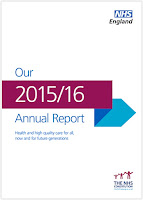Things not working quite as they should... ...ooops
The notifications we send out to let our library members to let them know about the blog all bounced back to us last week from SCH email addresses. Thanks to those that let us know and apologies to everyone. We are trying to work around this problem (caused by our IT dept unexpectedly blocking certain types of attachments) as it may affect other aspects of our communication. Hopefully we will have a solution soon.
Things about new NICE guidelines...

Three new guidance publications that may be of interest.
"Sepsis: recognition, diagnosis and early management".This guideline covers the recognition, diagnosis and early management of sepsis for all populations. The guideline committee identified that the key issues to be included were: recognition and early assessment, diagnostic and prognostic value of blood markers for sepsis, initial treatment, escalating care, identifying the source of infection, early monitoring, information and support for patients and carers, and training and education.
"
Diabetes in children and young people". This quality standard covers the diagnosis and management of type 1 and type 2 diabetes in children and young people aged under 18. This quality standard will not cover care for children and young people with other forms of diabetes mellitus (such as monogenic diabetes or cystic fibrosis-related diabetes).
"Urinary tract infection in under 16s: diagnosis and management".This NICE guideline is about the care and treatment in the NHS in England and Wales of babies, children and young people who are younger than 16 years with a urinary tract infection (UTI).It was previously called urinary tract infection in children: diagnosis, treatment and long-term management.The advice in the NICE guideline covers the investigations and treatment that should be given to children younger than 16 years who have a UTI, and the information that should be offered to their families.
 Things about looked after children...
Things about looked after children...
A report from Care Quality commission
'Not seen, not heard' Healthcare services and other organisations that work with children and young people have a responsibility to keep them safe. Vulnerable children and young people in England are not getting the help they need when and where they need it. The risks of harm to many children are revealed with the right questions and support.In their review of 50 local area inspections, they found health and social care services failing to adequately support young people. They also found examples of innovative and outstanding care.
Things about the risk of deterioration...

RCPCH and NHS Improvement have developed a
"Safe system framework for children at risk of deterioration" This framework aims to improve recognising and responding to children at risk of deterioration. A safer system can develop a patient safety culture. It can work in partnership with families and patients and it can support ongoing learning.
Things about children and 'screen time'...

An interesting Media Policy Brief from LSE -
"Families and screen time: Current advice and emerging research" They have some recommendations to address the debates around digital media and ‘screen time’ that preoccupy parents and policy-makers.
Commercial providers approach parents as a market, but are also invested in efforts to help parents and children access opportunities. This report has shown that the current advice for parents does not address the range of parental concerns, nor does it support parents to draw confidently on their own digital and non-digital expertise to positively engage with their children.
Things about Qualitative Research...
 A 3 day course run by ScHARR in Sheffield
A 3 day course run by ScHARR in Sheffield. The course will follow the systematic review process as it applies, and is adapted to, qualitative evidence synthesis. The Programme Faculty will take participants through the stages of defining and exploring scope, conducting the literature searches, quality assessing studies for inclusion, synthesising data and writing up and presenting the product of the synthesis. Participants will be provided with practical experience of key stages in the review process. Early Bird payment by this Sunday 17th July.
Other courses that may be of interest can be seen
here.
 Things to eat...
Things to eat...
As we are all thinking about the people of Nice today, and express our sympathy to all those involved in last night's incident, I thought I would choose a Delia recipe for
Pissaladiere (originating from that area of France) for today.
 Things published...
Things published...
 Don't forget we have an excellent selection of leisure reading books to suit everyone - why not pop up and take a look before you head off for your holidays. Or you can see them on the catalogue.
Don't forget we have an excellent selection of leisure reading books to suit everyone - why not pop up and take a look before you head off for your holidays. Or you can see them on the catalogue. Many years ago when Web 2.0 was a "new thing" I went on a training session to find out what it was all about. As part of that we were introduced to concept of a 'Blog' and one that we looked at was written by Clotilde Dusoulier who is a French food writer based in Paris - writing in English. Her blog which she started in 2003 is called Chocolate & Zucchini...and I have been following it ever since. If you want to you can follow it yourself or sign up to a newsletter she produces. I was particularly taken with this recipe and hope to try it out soon - Feta and fresh herb quick bread
Many years ago when Web 2.0 was a "new thing" I went on a training session to find out what it was all about. As part of that we were introduced to concept of a 'Blog' and one that we looked at was written by Clotilde Dusoulier who is a French food writer based in Paris - writing in English. Her blog which she started in 2003 is called Chocolate & Zucchini...and I have been following it ever since. If you want to you can follow it yourself or sign up to a newsletter she produces. I was particularly taken with this recipe and hope to try it out soon - Feta and fresh herb quick bread























